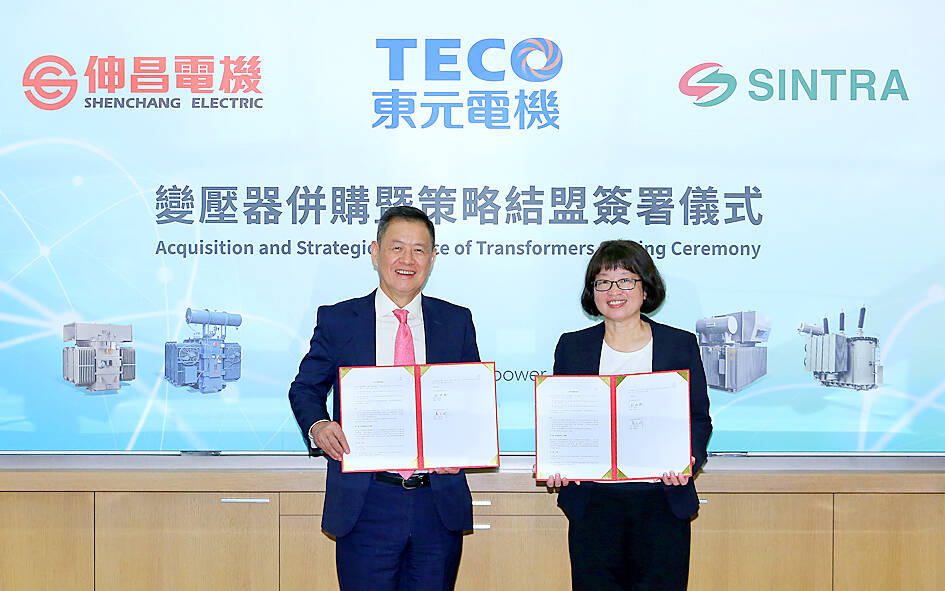Teco Electric & Machinery Co (東元電機), one of Taiwan’s leading suppliers of electric motors, yesterday announced plans to acquire local transformer maker Shenchang Electric Co (伸昌電機) for not more than NT$550 million (US$17.21 million).
The deal — which also includes forming a strategic alliance with Shenchang’s Indonesian affiliate PT Sintra Sinarindo Elektrik — is expected to begin contributing revenue to Teco Electric next quarter, the company said in a statement.
The deal comes as Teco aims to pursue global transformer business, especially in North America, and grab electromechanical business opportunities in Indonesia.

Photo courtesy of Teco Electric & Machinery Co
At a media gathering last month, Teco chairman Morris Li (利明献) unveiled the company’s three-year development plan that focuses on high-potential businesses, including green energy, power conservation, carbon reduction and electrification, as the company targets becoming a comprehensive solution provider.
In yesterday’s statement, Li said that the deal would help improve the company’s electrification product portfolio and achieve its goal of becoming an “industrial electrification integrator.”
Established in 1971, Shenchang primarily produces distribution transformers and has been active in the Indonesian market since 1996, serving companies such as Taiwan Power Co (Taipower, 台電), Formosa Plastics Group (台塑集團), PT PLN (Persero) and Siemens AG, Teco said.
Under the terms of the deal, Teco plans to acquire a 57.2 percent stake in Shenchang to become a majority shareholder and help expand Shenchang’s manufacturing facilities in Taiwan, it said.
The companies are also eying the transformer markets in Taiwan and North America, and plan to broaden their product portfolio to 69 kilovolt (kV) to 161kV power transformers in the near term, Teco added.
Moreover, the companies aim to provide green solutions amid the growing trend of climate awareness, rising demand for data centers and significant infrastructure upgrades in the US, Teco said.
The initial focus would be on meeting the enormous demand for distribution transformers in North America; in Taiwan, particularly in the industrial sector; for new energy projects and data centers; and for Taipower projects that aim to enhance the state utility’s power grid and operational resilience, it said.

When an apartment comes up for rent in Germany’s big cities, hundreds of prospective tenants often queue down the street to view it, but the acute shortage of affordable housing is getting scant attention ahead of today’s snap general election. “Housing is one of the main problems for people, but nobody talks about it, nobody takes it seriously,” said Andreas Ibel, president of Build Europe, an association representing housing developers. Migration and the sluggish economy top the list of voters’ concerns, but analysts say housing policy fails to break through as returns on investment take time to register, making the

‘SILVER LINING’: Although the news caused TSMC to fall on the local market, an analyst said that as tariffs are not set to go into effect until April, there is still time for negotiations US President Donald Trump on Tuesday said that he would likely impose tariffs on semiconductor, automobile and pharmaceutical imports of about 25 percent, with an announcement coming as soon as April 2 in a move that would represent a dramatic widening of the US leader’s trade war. “I probably will tell you that on April 2, but it’ll be in the neighborhood of 25 percent,” Trump told reporters at his Mar-a-Lago club when asked about his plan for auto tariffs. Asked about similar levies on pharmaceutical drugs and semiconductors, the president said that “it’ll be 25 percent and higher, and it’ll

NOT TO WORRY: Some people are concerned funds might continue moving out of the country, but the central bank said financial account outflows are not unusual in Taiwan Taiwan’s outbound investments hit a new high last year due to investments made by contract chipmaker Taiwan Semiconductor Manufacturing Co (TSMC, 台積電) and other major manufacturers to boost global expansion, the central bank said on Thursday. The net increase in outbound investments last year reached a record US$21.05 billion, while the net increase in outbound investments by Taiwanese residents reached a record US$31.98 billion, central bank data showed. Chen Fei-wen (陳斐紋), deputy director of the central bank’s Department of Economic Research, said the increase was largely due to TSMC’s efforts to expand production in the US and Japan. Investments by Vanguard International

WARNING SHOT: The US president has threatened to impose 25 percent tariffs on all imported vehicles, and similar or higher duties on pharmaceuticals and semiconductors US President Donald Trump on Wednesday suggested that a trade deal with China was “possible” — a key target in the US leader’s tariffs policy. The US in 2020 had already agreed to “a great trade deal with China” and a new deal was “possible,” Trump said. Trump said he expected Chinese President Xi Jinping (習近平) to visit the US, without giving a timeline for his trip. Trump also said that he was talking to China about TikTok, as the US seeks to broker a sale of the popular app owned by Chinese firm ByteDance Ltd (字節跳動). Trump last week said that he had